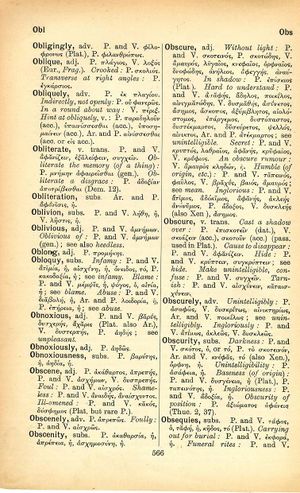obliquely: Difference between revisions
From LSJ
καλῶς γέ μου τὸν υἱὸν ὦ Στιλβωνίδη εὑρὼν ἀπιόντ' ἀπὸ γυμνασίου λελουμένον οὐκ ἔκυσας, οὐ προσεῖπας, οὐ προσηγάγου, οὐκ ὠρχιπέδισας, ὢν ἐμοὶ πατρικὸς φίλος → Ah! Is this well done, Stilbonides? You met my son coming from the bath after the gymnasium and you neither spoke to him, nor kissed him, nor took him with you, nor ever once felt his balls. Would anyone call you an old friend of mine?
(Woodhouse 4) |
(CSV4) |
||
| Line 1: | Line 1: | ||
{{ | {{Woodhouse1 | ||
| | |Text=[[File:woodhouse_566.jpg|thumb|link={{filepath:woodhouse_566.jpg}}]]'''adv.''' | ||
P. ἐκ πλαγίου. | |||
<b class="b2">Indirectly, not openly</b>: P. οὐ φανερῶς. | |||
<b class="b2">In a round about way</b>: V. [[πέριξ]]. | |||
<b class="b2">Hint at obliquely</b>, v.: P. παραδηλοῦν (acc.), ὑπαινίσσεσθαι (acc.), ὑποσημαίνειν (acc.), Ar. and P. αἰνίσσεσθαι (acc. or εἰς acc.). | |||
}} | }} | ||
Revision as of 09:47, 21 July 2017
English > Greek (Woodhouse)
adv.
P. ἐκ πλαγίου. Indirectly, not openly: P. οὐ φανερῶς. In a round about way: V. πέριξ. Hint at obliquely, v.: P. παραδηλοῦν (acc.), ὑπαινίσσεσθαι (acc.), ὑποσημαίνειν (acc.), Ar. and P. αἰνίσσεσθαι (acc. or εἰς acc.).

